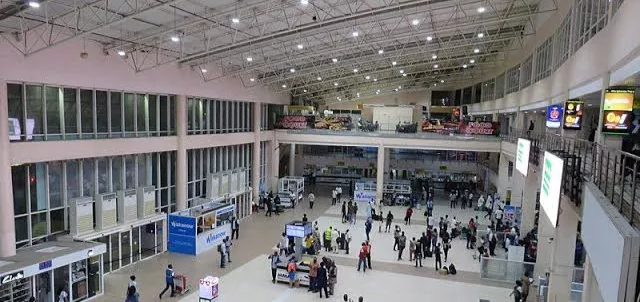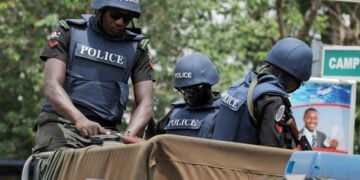Airports are meant to be disciplined spaces governed by rules, procedures, and professional enforcement. However, recent high-profile incidents in Nigeria’s major airports suggest a troubling erosion of these standards.
The public spat between Senator Adams Oshiomhole and Air Peace, Fuji music star Wasiu Ayinde’s altercation with ValueJet. The viral footage of a passenger physically assaulting airline staff and subsequent videos of airline security harassing her on an Ibom Air flight show our psychology, that anything goes in Nigeria.
These events form a pattern where personal entitlement collides with weak institutional capacity to prevent, contain, and penalise disorder.
The Oshiomhole and Air Peace case illustrates how minor disputes can spiral into a public spectacle. The Senator claims he was denied boarding despite checking in online the night before; the airline insists he failed to check in, arrived late, and tried to force his way on board. What should have been a straightforward enforcement of boarding policy turned into accusations of extortion, disruption, and public embarrassment — a sign that grievance resolution mechanisms in our airports are neither robust nor trusted.
Similarly, Wasiu Ayinde’s confrontation with ValueJet exposed lapses in discipline and accountability. Removed from a flight after a disagreement over carrying a flask, the musician was filmed on the tarmac in front of the aircraft, delaying departure. Regulators reacted by placing him on a no-fly list and sanctioning airline staff — a mixed message undermining the principle of consistent rule enforcement.
The incident involving Comfort Emmanson on an Ibom Air flight further underlines the safety risks. Captured on video slapping and kicking airline and airport officials after allegedly refusing repeated instructions to switch off her phone before take-off, she was banned from flying with the airline and reported to regulators and police.
Another short clip recorded by the passenger appeared to capture her telling officials to let her alight, fuelling debates over whether the incident was mishandled. This type of behaviour not only endangers passengers and crew but also erodes the authority of aviation safety protocols.
“The flask held by Kwam 1 shouldn’t have followed him to the foot of the aircraft, except that he was made to tell what was in the flask. So, it is a failure of the ground staff that made Kwam 1 have access to the door of the aircraft with the flask” argued Nuhu Adams, Former General Manager, Business Development, Federal Airports Authority of Nigeria (FAAN) and former Head of Government Relations of the then Virgin Nigeria Airways. According to him, this indicates the Nigerians’ mentality of seeing many people committing a crime and getting away with it, from who you know to browbeating oneself out of a scuffle.
These episodes reveal three underlying systemic failures. First is inconsistent enforcement. Nigerian aviation laws already criminalise the obstruction of an aircraft and assault of crew members. Yet, application is uneven — often influenced by the offender’s profile, the agency in charge, and public pressure. Second is the presence of procedural gaps. Weak check-in systems, opaque boarding policies, and unclear grievance processes create opportunities for disputes to escalate. Third is the cultural factor: celebrity status, political influence, and the lure of instant social media vindication encourage defiance rather than compliance.
Fixing this pattern requires prioritising high-leverage interventions. Regulators must develop and publish a single enforcement protocol for unruly behaviour, detailing penalties, timelines, and investigative processes.
These rules must be applied equally to all passengers, regardless of status. Airports and airlines should also operate under harmonised operational rules that allocate responsibilities, ensuring minor disagreements are resolved swiftly and professionally — not on the tarmac or the aisles.
It was a relief that the Minister of Aviation and Aerospace Development, Festus Keyamo, decided to amicably end the impasse involving Kwam 1 and Emmanson the way he did. However, he deliberately failed to mention the incident involving Senator Adams Oshiomole. Did we learn any lessons from the incidents?
If Nigeria is serious about building a safe and modern aviation sector, we believe that the focus must shift from outrage to reform. Standardising enforcement, closing procedural gaps, and aligning incentives for compliance will not only restore discipline in our airports but also reinforce public confidence in the aviation system. Anything less will guarantee more viral embarrassments — and greater risks to public safety.
Furthermore, swift and proportionate punishment must be paired with corrective measures. Passengers guilty of endangering flights should face prosecution or administrative sanctions. At the same time, those whose misconduct stems from ignorance or misunderstanding should undergo mandatory safety education before being allowed to fly again. Airline security should also show professionalism in handling unruly passengers to avoid the unavoidable and embarrassing incident between the airport security and Miss Emmerson. Airlines should also invest in crew de-escalation training and run public awareness campaigns about passenger responsibilities.
Above all, public officials and celebrities must be held to the same standards as ordinary travellers. Selective enforcement not only undermines the law but also normalises indiscipline. The cost of airport disorder extends far beyond the immediate spectacle — it delays flights, increases operational costs, tarnishes Nigeria’s aviation image, and weakens the civic norms that underpin safe travel.





